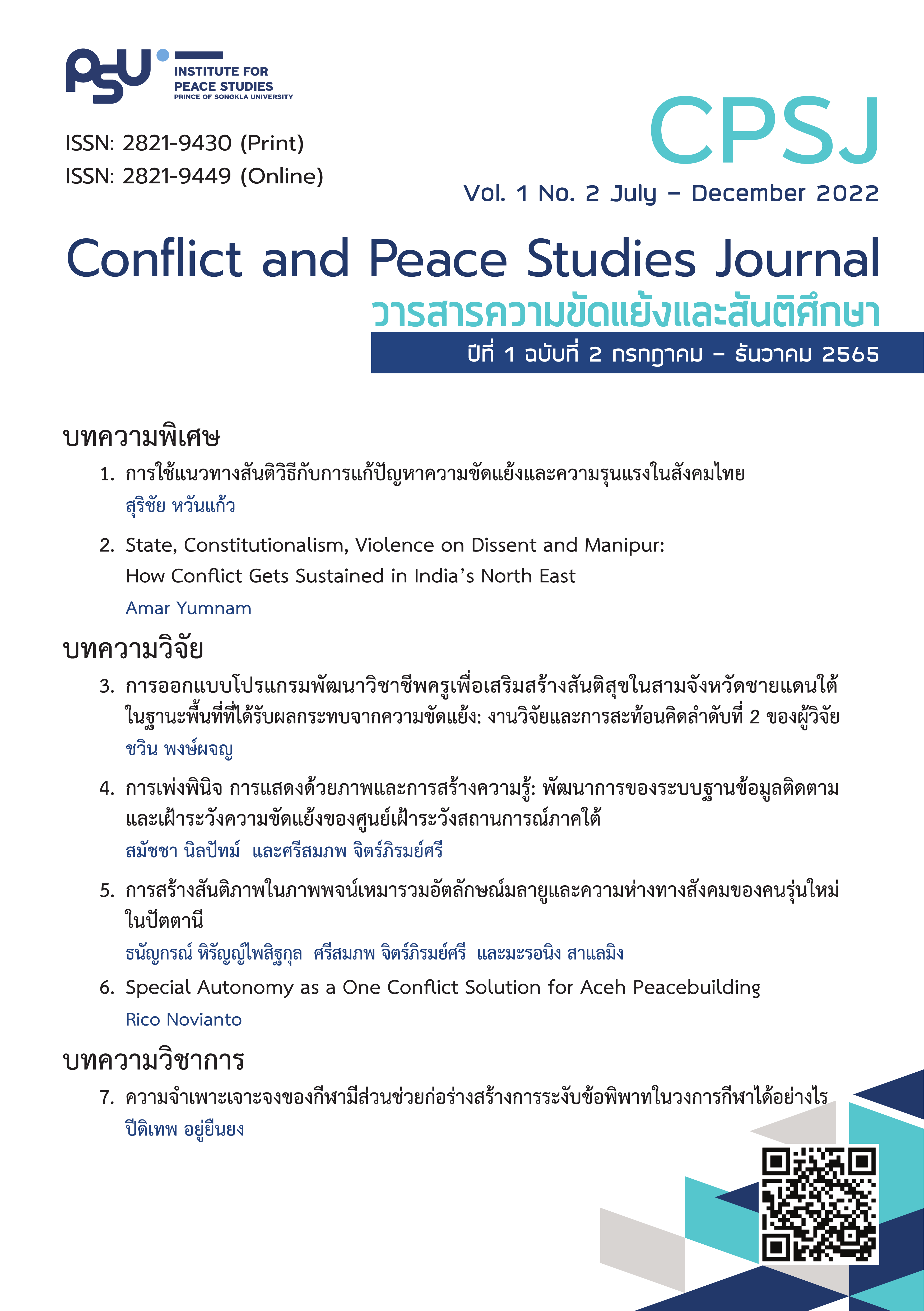How Specificity of Sports Shapes Dispute Resolution in Sport
Main Article Content
Abstract
An autonomous jurisdiction in global sport is defined as an area of a sports governing body (SGB) that has a degree of self-autonomy and has freedom from an external authority. As SGBs developed, members and all relevant stakeholders of SGBs recognized that self-regulation is necessary in order to protect fairness and integrity in global sports. Self-regulation in sports generally encompasses the SGBs to create their own substantive and procedural rules for controlling economic and social activities in global sports. These rules are characterized by key features of economic and social activities in sports worldwide. Sport-related disputes involving SGBs, their members or other sports participants generally fall under the jurisdiction of SDBs such as SGBs’ bodies or independent dispute resolution institutions. In addition, the inherent characteristics of dispute resolution ensured that such disputes are quickly resolved and that the procedural rules in sport in that particular sports jurisdiction continually adapted to the evolutions in the manner in which economic and social activities in sports are conducted. This paper aims to set out the specific characteristics of sports autonomy and obligations arising from the membership of the SDBs. It tries to specify the autonomous power of sports which the SGBs possesses in relation to influence the form of resolving a variety of sports-related disputes. This paper also discusses on functions of the procedure in global sports and recognition of the Court of Arbitration for Sport (CAS) as a global independent institution that facilitates the resolution of global sports-related disputes worldwide.
Article Details
References
Abanazir, C. (2019). E-Sport and the EU: The View from the English Bridge Union, The International Sports Law Journal, 18(3-4), 102-113.
Arnaut, J. A. (2006). Independent European Sport Review 2006. Brussels: Council of the European Union & UK Presidency of the European Union.
Blackshaw, I. (2007). The 'specificity of sport' and the EU white paper on sport: Some comments. The International Sports Law Journal, (3-4), 87-88.
Boillat, C., & Poli, R. (2014). Governance models across football associations and leagues. Neuchâtel: Le Centre International d’Etude du Sport.
Celik, B. (2020). The Impact of the EU on the European Model of Sport (Doctoral Thesis, Edge Hill University, Ormskirk, UK). Retrieved September 22, 2022, from https://research.edgehill.ac.uk/ws/portalfiles/portal/46626745/PHD_THESIS.pdf
Chappelet, J. (2010). Autonomy of sport in Europe. Strasbourg Cedex: Council of Europe Publishing.
Commission of the European Communities. (2007). White Paper on Sport. Brussels: Commission of the European Communities.
Ecorys, KEA European Affairs & Sport and Citizenship. (2016). Mapping and Analysis of the Specificity of Sport: A Final Report to the DG Education & Culture of the European Commission. Brussels: European Commission Directorate-General for Education and Culture.
Fédération Française de Football. (2020). Procès-verbal du Comité Exécutif (Jeudi 16 avril 2020). Paris: Fédération Française de Football.
Gábriš, T. (2010). The Specificity of Sports in the International and EU Law, Annals - Juridical Science Series, 2, 169-200.
Geeraert, A., Mrkonjic, M., & Chappelet, J. (2014). A rationalist perspective on the autonomy of international sport governing bodies: towards a pragmatic autonomy in the steering of sports. International Journal of Sport Policy and Politics, 7(4), 473-488.
Giulianotti, R. (2011). Sport, Peacemaking and Conflict Resolution: A Contextual Analysis and Modeling of the Sport, Development and Peace Sector. Ethnic and Racial Studies, 34(2), 207–228.
Government of Ontario. (2019). Athletics Control Act, R.S.O. 1990, c. A.34. Retrieved September 21, 2022, from https://www.ontario.ca/laws/statute/90a34
Governance Institute. (2019). The Future of Sports Governance Beyond Autonomy. London: Chartered Governance Institute UK & Ireland.
Hylton, J. G. (2017). How FIFA Used the Principle of Autonomy of Sport to Shield Corruption in the Sepp Blatter Era. Maryland Journal of International Law, 32(1), 134-159.
Kehrli, K. (2014). The Unspecified Specificity of Sport: A Proposed Solution to the European Court of Justice’s Treatment of the Specificity of Sport. Brooklyn Journal of International Law, 39(1), 403-441.
Mason, D. S., Thibault, L., & Misener, L. (2006). An Agency Theory Perspective on Corruption in Sport: The Case of the International Olympic Committee, Journal of Sport Management, 20(1), 52-73.
McArdle, D. (2015). Dispute resolution in sport: athletes, law, and arbitration. New York, NY: Routledge.
O’Leary, L. (2021). Independence and impartiality of sports disputes resolution in the UK. The International Sports Law Journal, 21(1), 243–256.
Panagiotopoulos, D. P. (2004). International Sports Rules' Implementation - Decisions Executability: The Bliamou Case. Marquette Sports Law Review, 15(1), 1-12.
Parrish, R., & Miettinen, S. (2008). ASSER International Sports Law Series: The Sporting Exception in European Union Law. Hague: T.M.C. Asser Press.
Pijetlovic, K., & Nyman-Metcalf, K. (2013). Liberalising the service market for satellite transmission: Interplay between intellectual property rights, specificity of sport and TFEU economic provisions in murphy (joined cases C-403/08 and C-429/08). The International Sports Law Journal, 13(1-2), 82-96.
Siekmann, R. (2012). The specificity of sport: sporting exceptions in EU law. Zbornik radova Pravnog fakulteta u Splitu, 49(4), 697-725.
Soiron, R., & Gobardhan, A. (2022). The Sports Law Review: France. Retrieved October 2, 2022, from https://thelawreviews.co.uk/title/the-sports-law-review/france

